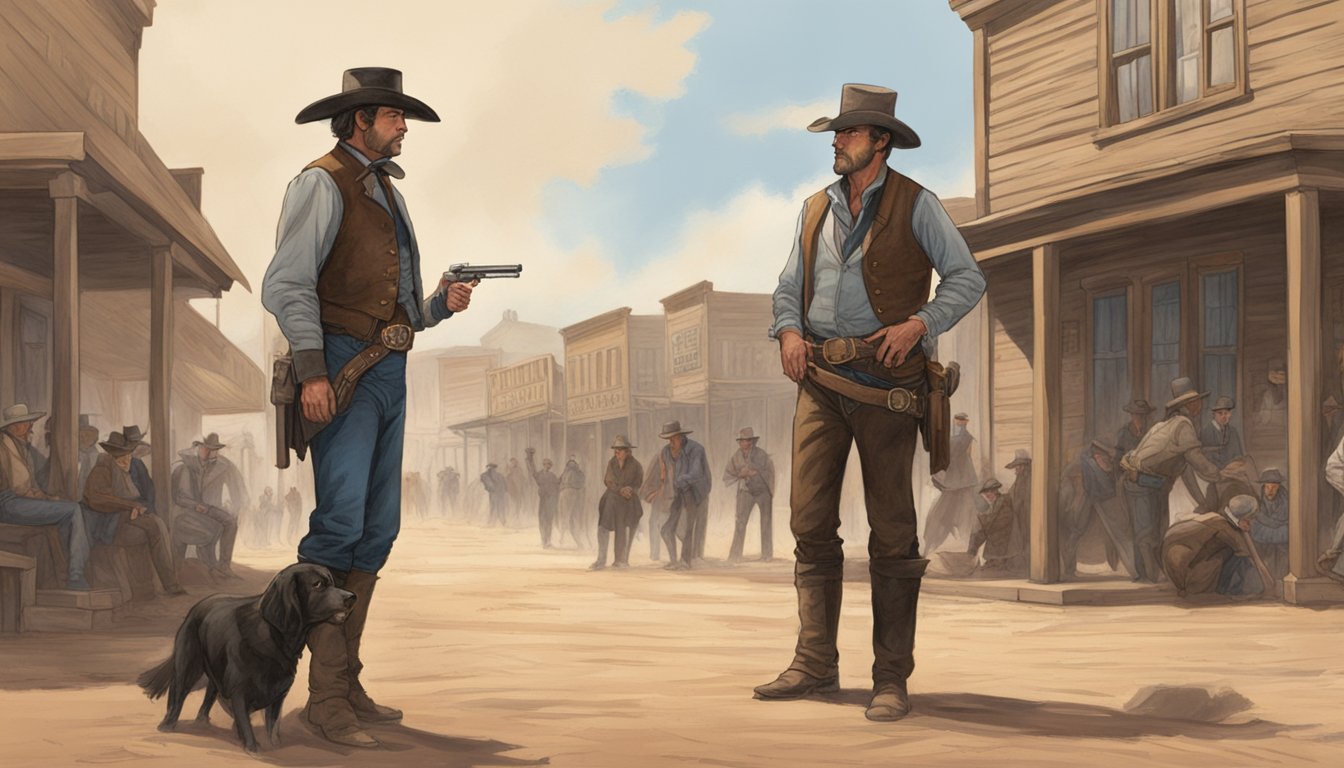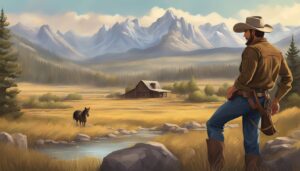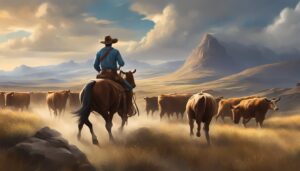Western heroes have long captivated audiences with their rugged individualism and moral complexity. Two iconic figures in this genre are John Dutton from the hit TV series “Yellowstone” and Joe Kidd from the 1972 film of the same name. Both characters embody the spirit of the American West, but in distinctly different ways.
John Dutton, portrayed by Kevin Costner in Taylor Sheridan’s neo-Western drama on Paramount Network, is a modern-day rancher fighting to preserve his family’s legacy. His unwavering dedication to protecting the Yellowstone ranch and his complicated relationships with his children make him a compelling anti-hero for the 21st century. Joe Kidd, played by Clint Eastwood, is a more traditional Western protagonist – a former bounty hunter drawn into a conflict between Mexican revolutionaries and wealthy landowners.
While both characters navigate moral gray areas, their approaches differ significantly. John Dutton uses political maneuvering and sometimes questionable tactics to maintain control over his vast Montana empire. Joe Kidd, on the other hand, relies on his sharpshooting skills and personal code of honor to resolve conflicts. These contrasting styles reflect the evolution of the Western genre from classic tales of frontier justice to more nuanced explorations of power and family dynamics in the modern West.
Character Backgrounds and Portrayals

John Dutton and Joe Kidd represent two distinct archetypes of Western heroes. Their backgrounds and portrayals offer unique insights into the complex world of Western fiction and the evolving landscape of the American frontier.
John Dutton: Patriarch of the Dutton Family
John Dutton, portrayed by Kevin Costner in the hit series Yellowstone, is the powerful patriarch of the Dutton family. He oversees the vast Yellowstone Ranch, the largest contiguous ranch in the United States.
Costner’s portrayal brings gravitas to the role, depicting John as a man deeply connected to the land and fiercely protective of his family’s legacy. His character embodies the struggle between tradition and progress in the modern West.
John’s background is rooted in generations of ranching history. He faces constant threats to his land and way of life, battling developers, politicians, and rival ranchers. This ongoing conflict forms the core of his character’s journey throughout the series.
Joe Kidd: An Outlaw in the Wild West
Joe Kidd, played by Clint Eastwood in the 1972 film of the same name, is a former bounty hunter turned outlaw. His character represents the classic Western antihero, operating in a morally ambiguous space.
Eastwood’s portrayal captures Joe’s rugged individualism and expert gunfighting skills. The character’s background includes a history of violence and a complex relationship with the law.
Joe Kidd becomes embroiled in a land dispute between Mexican revolutionaries and a wealthy landowner. His journey showcases the shifting alliances and moral dilemmas common in Western narratives.
The character’s past as a bounty hunter informs his actions, blending elements of lawman and outlaw. This duality adds depth to Joe Kidd’s portrayal as a Western hero.
Narrative and Major Themes

John Dutton and Joe Kidd navigate complex power dynamics and conflicts in their respective stories. Both characters face threats to their way of life, leading to intense struggles for control and acts of revenge.
Power Struggles and Control
John Dutton fiercely defends his vast Yellowstone ranch against numerous threats. He battles land developers, Native American tribes, and government entities seeking to encroach on his property. Dutton’s power stems from his family legacy and deep connection to the land.
Joe Kidd, in contrast, finds himself caught between conflicting forces. He must choose sides in a dispute between Mexican revolutionaries and wealthy landowners. Kidd’s power lies in his skilled marksmanship and ability to survive in harsh environments.
Both characters exert control through different means. Dutton relies on political influence and sometimes questionable tactics. Kidd uses his cunning and combat skills to navigate dangerous situations.
Conflict and Revenge
Yellowstone’s narrative thrives on ongoing conflicts. The Dutton family faces constant challenges from outsiders seeking to take their land. John often resorts to extreme measures, including violence, to protect his interests.
The “train station” serves as a chilling symbol of Dutton’s approach to dealing with enemies. It represents a remote location where bodies are disposed of, highlighting the dark lengths he’ll go to preserve his empire.
Joe Kidd’s story centers on a specific conflict. He initially resists involvement but is drawn into a violent struggle. Kidd’s quest for revenge against those who wronged him becomes a driving force in the plot.
Both narratives explore how violence perpetuates cycles of revenge, shaping the characters’ actions and motivations.
Cultural and Historical Context

Westerns have evolved significantly in television, with shows like Yellowstone reimagining the genre for modern audiences. These contemporary portrayals blend traditional Western themes with current issues, offering new perspectives on historical representation.
Westerns in Contemporary Television
Yellowstone, created by Taylor Sheridan, exemplifies the Neo-Western genre on television. The show airs on Paramount Network and streams on Paramount+, reaching a wide audience. It combines classic Western elements with modern storytelling techniques.
Yellowstone’s success has spawned spin-offs like 1883 and 1923, expanding the Dutton family saga across different time periods. These series explore the American West through various historical lenses.
The show’s popularity has reignited interest in Western-themed content. It tackles contemporary issues while maintaining ties to traditional Western narratives.
Historical Representation in Westerns
Westerns often blend historical fact with fiction to create compelling narratives. Yellowstone and its spin-offs strive for authenticity in depicting ranch life and the challenges of the Modern West.
1883 and 1923 offer glimpses into earlier periods of American history, showcasing the evolution of the West. These shows highlight the hardships faced by settlers and indigenous peoples.
Taylor Sheridan’s works, including the upcoming 6666, aim to present a more nuanced view of Western history. They address topics like land rights, Native American issues, and the changing face of the American frontier.
Character Analysis
John Dutton and Joe Kidd embody complex Western protagonists with contrasting leadership styles and moral foundations. Their characters captivate audiences through a mix of strength, flaws, and nuanced motivations.
John Dutton’s Leadership and Moral Compass
John Dutton’s leadership stems from his unwavering commitment to preserving his family’s legacy and the Yellowstone ranch. He often makes difficult decisions, blurring ethical lines to protect his interests.
Dutton’s moral compass fluctuates between ruthlessness and compassion. He can be brutal in his tactics against opponents, yet shows moments of kindness to his family and loyal ranch hands.
His relationships with children Beth, Kayce, and Jamie reveal a complex family dynamic. John’s expectations and tough love approach create tension and loyalty in equal measure.
Dutton’s character depth comes from his vulnerability. Despite projecting strength, he grapples with personal loss and the weight of maintaining his empire.
Joe Kidd’s Antihero Traits and Viewer Appeal
Joe Kidd exemplifies the classic Western antihero. His morally ambiguous nature and skilled gunmanship make him a compelling protagonist.
Kidd’s past as a bounty hunter adds layers to his character, suggesting a life lived on the fringes of society. This background informs his actions and decisions throughout his story.
His reluctance to get involved in conflicts, followed by a change of heart, resonates with viewers. This arc showcases growth and a hidden sense of justice beneath his tough exterior.
Kidd’s taciturn nature and unpredictable actions keep audiences guessing. His blend of self-interest and occasional altruism creates a character that defies easy categorization.
Production and Entertainment Value

Yellowstone and Joe Kidd represent two eras of Western entertainment, each with distinct production approaches and audience impacts. Their contrasting styles highlight evolving trends in the genre.
Yellowstone’s Impact on Modern Television
Yellowstone revolutionized the Western genre for contemporary audiences. Created by Taylor Sheridan, the series blends traditional Western themes with modern storytelling techniques. The show’s high production values, including stunning Montana landscapes, contribute to its visual appeal.
Paramount Network’s flagship series garnered massive viewership, becoming cable TV’s most-watched show. Its success spawned multiple spin-offs, expanding the Yellowstone universe. The series’ popularity led to increased interest in Western-themed content across various platforms.
Yellowstone’s streaming rights deal with Peacock further expanded its reach, allowing new audiences to discover the Dutton family saga. This multi-platform approach exemplifies the changing landscape of television distribution and consumption.
Critical Reception and Audience Ratings
Yellowstone received mixed critical reviews but achieved phenomenal audience ratings. Critics praised Kevin Costner’s portrayal of John Dutton and the show’s cinematography. Some reviewers noted the series’ melodramatic elements and complex plot lines as both strengths and weaknesses.
Audience response was overwhelmingly positive. Yellowstone’s Season 5 premiere drew 12.1 million viewers, setting a new record for the series. The show consistently outperformed its cable TV competitors in key demographics.
Fans lauded the series for its intense family drama, power struggles, and exploration of contemporary Western issues. Social media buzz and word-of-mouth recommendations contributed to the show’s growing popularity across seasons.
Series Legacy and Spinoffs

Yellowstone’s impact extends far beyond its original series, spawning a franchise that explores different eras of the Dutton family saga. The show’s success has revitalized interest in the Western genre and influenced popular culture.
Yellowstone’s Extension into Franchise
Yellowstone’s popularity led to the creation of multiple spinoffs. The prequel series 1883 depicts the Dutton family’s journey to Montana in the late 19th century. 1923 focuses on an earlier generation of Duttons during Prohibition and the Great Depression. Another planned spinoff, 6666, is set to explore the legendary Four Sixes Ranch in Texas.
These spinoffs expand the Dutton family history across different time periods. They provide deeper context to the modern-day events of Yellowstone. Paramount+ hosts most of these spinoffs, while the main series airs on the Paramount Network.
Influence on Popular Culture and Western Genre
Yellowstone has revitalized the Western genre for modern audiences. The show blends traditional Western elements with contemporary themes and conflicts. Its portrayal of the modern West resonates with viewers, sparking renewed interest in ranching culture and Western lifestyles.
The series has influenced fashion trends, with Western wear gaining popularity. It has also boosted tourism in Montana, where much of the show is filmed. Yellowstone’s success has paved the way for more neo-Western content in television and streaming services.
Taylor Sheridan’s creation has become a cultural phenomenon, inspiring discussions about land rights, family legacy, and the changing face of the American West. The franchise’s expansion continues to captivate audiences and shape the television landscape.
Conclusion

John Dutton and Joe Kidd stand as iconic Western heroes, each leaving an indelible mark on the genre. Dutton’s complex portrayal in Yellowstone captivated audiences for years, while Kidd’s stoic presence in a classic film endures.
The Dutton family saga resonated with viewers through its exploration of legacy, loyalty, and power. John’s relationships with Kayce, Jamie, and Rip shaped the series’ emotional core. Paramount’s hit show brought the modern Western to new heights of popularity.
Joe Kidd, though featured in a single film, exemplifies the classic lone gunman archetype. His moral compass and skilled marksmanship made him a memorable character in Western cinema.
Both characters faced formidable challenges, protecting their interests against powerful adversaries. Their unwavering determination and tactical prowess set them apart as impressive figures in their respective stories.
Ultimately, the impact of these characters extends beyond their fictional worlds. They represent different eras of the Western genre, showcasing its evolution and enduring appeal to audiences.



